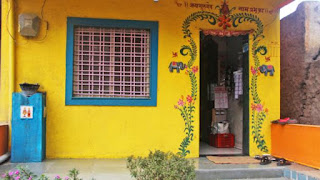Why this village, including its bank, has no front doors
Imagine a village where homes have no front doors
and shops are always left unlocked and locals never feel unsafe.
This is the story of shani shingnapur in India’s
Maharashtra state, where villagers feel secured because of their undying faith
in lord shani, the god of Saturn, who is considered the guardian of the
village.
 According to a legend, more than 300 years ago, an
iron and stone slab washed up in a nearby river during a flood and began oozing
blood when cattle herders poked it with a stick.
According to a legend, more than 300 years ago, an
iron and stone slab washed up in a nearby river during a flood and began oozing
blood when cattle herders poked it with a stick.
Later that night, shani appeared in the dreams of
the village head, revealing that the slab was his own idol. The deity ordered
that the slab should be kept in the village, where he would reside from here on
with one condition that the rock and its colossal powers must not be sheltered
as he needed to be able to oversee the village without hindrance. Shani
promised to protect the village from danger.
After the villagers installed the huge slab on a
roofless platform in the heart of town, they decided to discard all doors and
locks. They didn’t need them anymore, not with the lord to watch over them.
Because of the legend, the residents of Shani Shingnapur
believe that their temple is a “jagrut devasthan” (an “alive temple”). The Shani God is seen as all powerful and
this has kept the pious community relatively crime free. However, that might be
changing. A documentary filmed in the 1990s has helped the village rise to
prominence, the impact being a large increase in tourism over recent years.
 This has of course helped the village economically. Where
once the villagers mainly relied on sugar cane farming as their main source of
income, tourism has usurped such trade with several thousand visitors pouring
in each day during high season.
This has of course helped the village economically. Where
once the villagers mainly relied on sugar cane farming as their main source of
income, tourism has usurped such trade with several thousand visitors pouring
in each day during high season.
They are there to pray to the deity, often bringing gifts
such as mustard oil as offerings to Shani. Others are there to witness the
spectacle and to see a village without doors. However, this has predictably led
to other problems. Some of which may threaten the traditional village way of
life.
With so many visitors to the village, crime is on the up.
Those that do not believe in the local deity, and wish to take advantage of the
resident’s traditions, find themselves in a place with very little security.
In 2010, a visitor reported that cash and valuables worth
35,000 rupees ($567) were stolen from his vehicle.
In 2012, gold ornaments worth 70,000 rupees ($1,135) were
stolen from an unlocked cupboard in the house of a temple trustee.
 And petty thefts are also on the increase with
pickpocketing and vehicle thefts taking place from areas around the temple.
And petty thefts are also on the increase with
pickpocketing and vehicle thefts taking place from areas around the temple.
Furthermore it is believed that many thefts go
unreported. The economy of the village revolves around the temple, so the
no-theft claim is important for continuing its popularity.
Currently you will find the occasional doorway with
planks blocking the entrance. This is to keep out wild animals.
This tradition has continued for generations. New constructions have to honour these protocols, too.
Because of this strange history, shani shingnapur attracts devotees from across india. Atleast 40,000 visitors pour in each day to see the once-humble shrine that has grown into a large temple with extensive property and donations.
Whatever the truth, times are changing and some villagers
are challenging this age-old custom, seeking permission from the gram-panchayat
(local self-government organisation) to install doors and locks to ensure the
safety of their family.
But most villagers at Shani Shingnapur hope that the
tradition will continue that Shani continues to protect them from every evil
eye for many centuries to come.









0 Comments